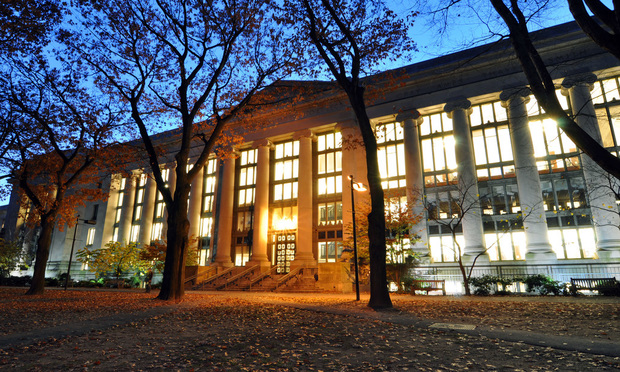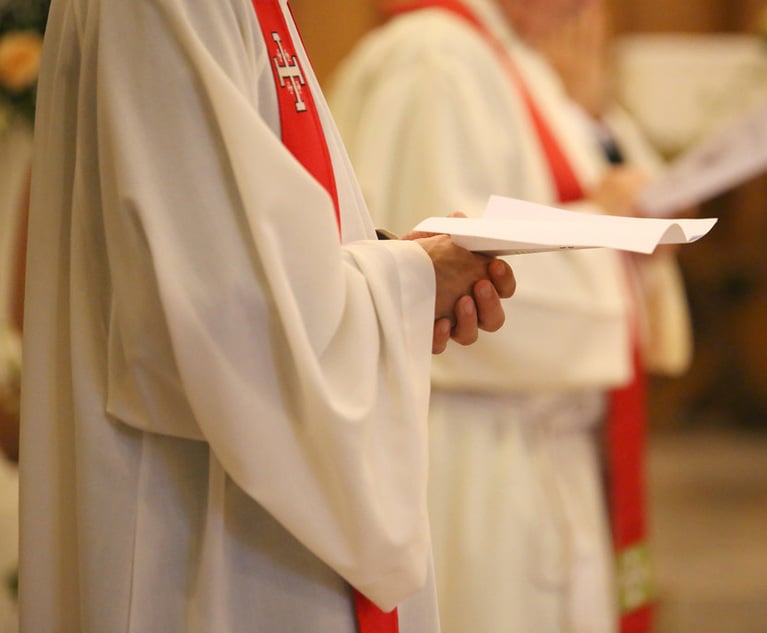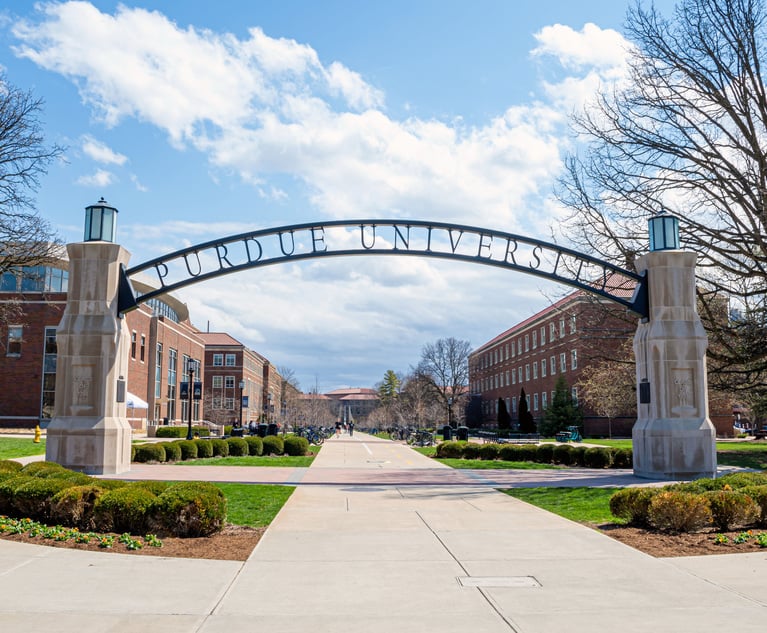New Report Shows Depression and Anxiety Are Prevalent at Harvard Law
Harvard Law administrators have vowed to do more to support student mental health and wellness after a 2017 survey showed that many struggle with depression and anxiety.
December 30, 2019 at 03:07 PM
4 minute read
 Harvard Law School Library in Langdell Hall at night.
Harvard Law School Library in Langdell Hall at night.
The long-awaited results of a 2017 mental health survey show that many students at Harvard Law School experience depression and anxiety and don't get enough sleep or exercise.
The school in late December released a report to students and members of the law school community with selected findings from the more than two-year-old survey after several years of lobbying from activists pushing for better mental health supports on campus.
Among survey respondents—which comprised about 44% of all students at the time—35% screened positive for mild depression; nearly 16% screened positive for moderate depression; and about 9% screened positive for either moderately severe depression or severe depression, according to the report. That means about 60% of respondents reported some signs of depression.
Meanwhile, 30% of the survey respondents screened positive for mild anxiety, 15% screened positive for moderate anxiety, and another 9% screened positive for severe anxiety according to the report, which was prepared by a working group on mental health formed by the law school and lead by several associate deans. The report says that rates of depression and anxiety are largely on par with—if not slightly lower—than other graduate students at Harvard who were also surveyed.
"The report provides us with a good sense of where we stand in the broader context of the profession, legal education, and graduate education more generally," law dean John Manning wrote in an email to students. "Through a series of thoughtful recommendations, the Working Group also lays out an initial framework for addressing the mental health and well-being challenges on our campus. They further identify some things we can do right away to improve student well-being."
Harvard law students are hardly alone in dealing with mental health and wellness challenges. A 2014 survey of 3,000 law students on 15 campuses found that 37% of respondents screened positive for anxiety and 14% of them met the definition of severe anxiety. Among those survey respondents, 18% had been diagnosed with depression, with one out of six being diagnosed while in law school. More than half of the surveyed students also reported getting drunk at least once in the past 30 days.
Many of the Harvard survey respondents also reported poor health and wellness practices. More than 40% of them said they don't feel rested when they wake up most days; nearly 81% don't meet the American Heart Association's exercise guidelines; and more than 37% screened positive for problem drinking.
That, too, mirrors other research on law student wellness. The 2019 Law School Survey of Student Engagement, which included survey responses from 18,000 students at 70 law schools across the country, found that 51% of women said they were sleeping five hours or less per night, as were 43% of men. Similarly, 70% of women and 60% of men said they spend five hours or less a week exercising.
Harvard Law School introduced some new mental health resources in the wake of the 2017 survey, including drop-in counseling sessions on the law school campus and expanded mental health training for those who advise students. But the report recommends additional services, such as pushing for the elimination of mental health questions on bar admission applications and ensuring students know what resources are available.
"Although we can never eliminate stress or worry entirely, we can aspire to reduce the stigma associated with mental health challenges, to help students better care for themselves and their peers, and to provide the robust continuum of wellness and mental health resources that students need to thrive at HLS," the report reads.
This content has been archived. It is available through our partners, LexisNexis® and Bloomberg Law.
To view this content, please continue to their sites.
Not a Lexis Subscriber?
Subscribe Now
Not a Bloomberg Law Subscriber?
Subscribe Now
NOT FOR REPRINT
© 2025 ALM Global, LLC, All Rights Reserved. Request academic re-use from www.copyright.com. All other uses, submit a request to [email protected]. For more information visit Asset & Logo Licensing.
You Might Like
View All
Librarian's Termination Violated First Amendment Protections, Lawsuit Claims
3 minute read
Divided State Supreme Court Clears the Way for Child Sexual Abuse Cases Against Church, Schools

Longtime Purdue GC Accused of Drunken Driving Hires Big-Name Defense Attorney
3 minute read
LSU General Counsel Quits Amid Fracas Over First Amendment Rights of Law Professor
7 minute readTrending Stories
- 1Thursday Newspaper
- 2Public Notices/Calendars
- 3Judicial Ethics Opinion 24-117
- 4Rejuvenation of a Sharp Employer Non-Compete Tool: Delaware Supreme Court Reinvigorates the Employee Choice Doctrine
- 5Mastering Litigation in New York’s Commercial Division Part V, Leave It to the Experts: Expert Discovery in the New York Commercial Division
Who Got The Work
J. Brugh Lower of Gibbons has entered an appearance for industrial equipment supplier Devco Corporation in a pending trademark infringement lawsuit. The suit, accusing the defendant of selling knock-off Graco products, was filed Dec. 18 in New Jersey District Court by Rivkin Radler on behalf of Graco Inc. and Graco Minnesota. The case, assigned to U.S. District Judge Zahid N. Quraishi, is 3:24-cv-11294, Graco Inc. et al v. Devco Corporation.
Who Got The Work
Rebecca Maller-Stein and Kent A. Yalowitz of Arnold & Porter Kaye Scholer have entered their appearances for Hanaco Venture Capital and its executives, Lior Prosor and David Frankel, in a pending securities lawsuit. The action, filed on Dec. 24 in New York Southern District Court by Zell, Aron & Co. on behalf of Goldeneye Advisors, accuses the defendants of negligently and fraudulently managing the plaintiff's $1 million investment. The case, assigned to U.S. District Judge Vernon S. Broderick, is 1:24-cv-09918, Goldeneye Advisors, LLC v. Hanaco Venture Capital, Ltd. et al.
Who Got The Work
Attorneys from A&O Shearman has stepped in as defense counsel for Toronto-Dominion Bank and other defendants in a pending securities class action. The suit, filed Dec. 11 in New York Southern District Court by Bleichmar Fonti & Auld, accuses the defendants of concealing the bank's 'pervasive' deficiencies in regards to its compliance with the Bank Secrecy Act and the quality of its anti-money laundering controls. The case, assigned to U.S. District Judge Arun Subramanian, is 1:24-cv-09445, Gonzalez v. The Toronto-Dominion Bank et al.
Who Got The Work
Crown Castle International, a Pennsylvania company providing shared communications infrastructure, has turned to Luke D. Wolf of Gordon Rees Scully Mansukhani to fend off a pending breach-of-contract lawsuit. The court action, filed Nov. 25 in Michigan Eastern District Court by Hooper Hathaway PC on behalf of The Town Residences LLC, accuses Crown Castle of failing to transfer approximately $30,000 in utility payments from T-Mobile in breach of a roof-top lease and assignment agreement. The case, assigned to U.S. District Judge Susan K. Declercq, is 2:24-cv-13131, The Town Residences LLC v. T-Mobile US, Inc. et al.
Who Got The Work
Wilfred P. Coronato and Daniel M. Schwartz of McCarter & English have stepped in as defense counsel to Electrolux Home Products Inc. in a pending product liability lawsuit. The court action, filed Nov. 26 in New York Eastern District Court by Poulos Lopiccolo PC and Nagel Rice LLP on behalf of David Stern, alleges that the defendant's refrigerators’ drawers and shelving repeatedly break and fall apart within months after purchase. The case, assigned to U.S. District Judge Joan M. Azrack, is 2:24-cv-08204, Stern v. Electrolux Home Products, Inc.
Featured Firms
Law Offices of Gary Martin Hays & Associates, P.C.
(470) 294-1674
Law Offices of Mark E. Salomone
(857) 444-6468
Smith & Hassler
(713) 739-1250








